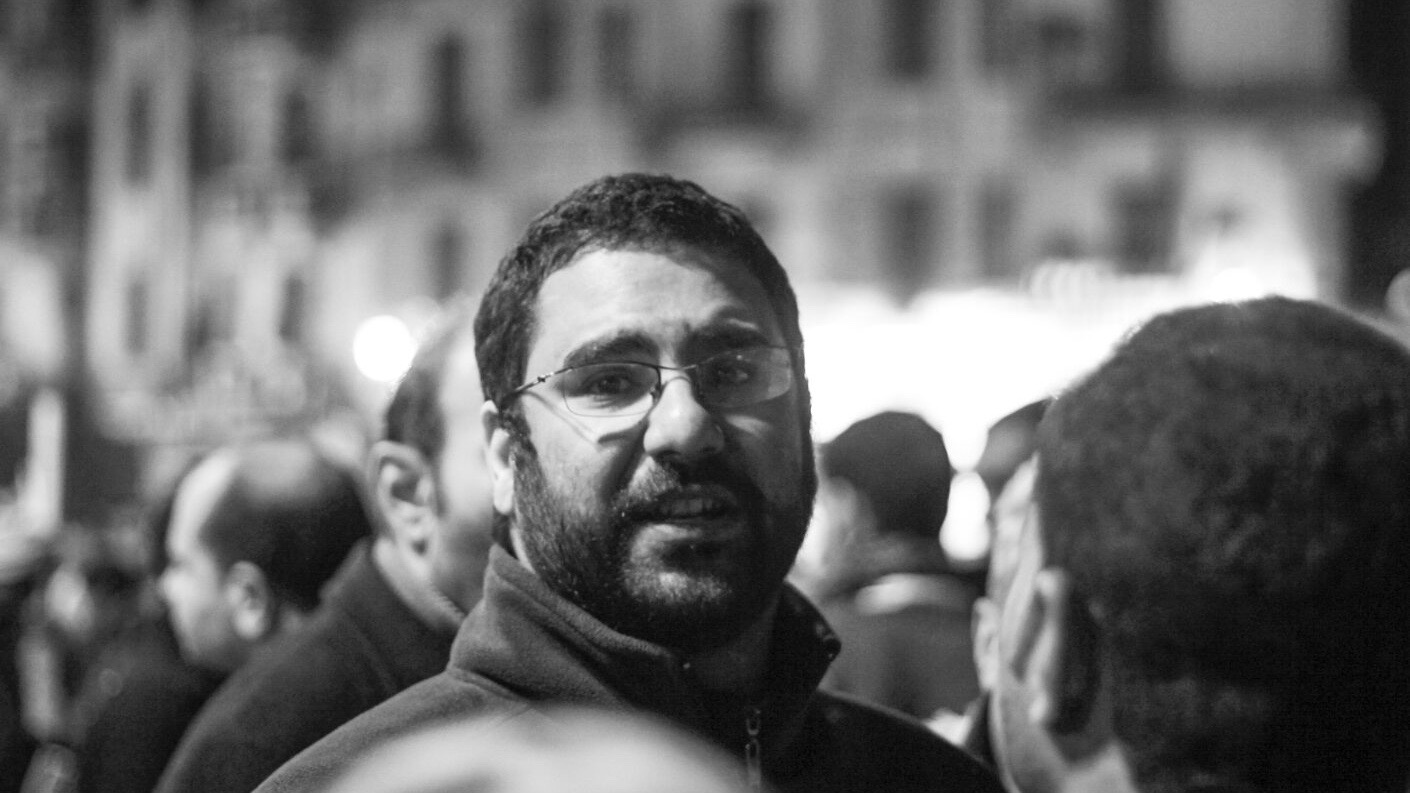Serious concerns have grown surrounding the health and safety of imprisoned Egyptian-British activist Alaa Abdel Fattah. His family has reported that they have had no contact with him for over 10 days. Egyptian prison officials claimed that Fattah had refused a visit from his mother Laila Soueif, herself a renowned activist, on July 24.
Soueif went to the Wadi El Natrun prison for the fourth consecutive day on July 27 in hopes of receiving some information. However, authorities told her once again that Fattah had refused to write to her or see her in person, something his family has deemed highly unusual and uncharacteristic. Meanwhile, consular visits have also been banned.
Fears that the 40-year-old’s life may be at risk are rising, given that he has been on hunger strike for over 117 days. Fattah’s sister Mona Seif stated that the last communication the family received from him was a letter dated July 16, which was withheld by Egyptian authorities until July 24.
Translation of parts of @alaa's letter to mama, written July 16th, we recieved it a week later.
Reading this you can hear his voice .. his heart reflected through every word.
This was Alaa's last communication .. What happened to him since then?#WhereisAlaa #طمنونا_على_علاء pic.twitter.com/DOQb5lISrV— Mona Seif (@Monasosh) July 27, 2022
“Alaa has been targeted by four different ruling regimes, through it all family communication were always a priority to him and us, and we were willing to risk our safety to maintain this line of communication…Now it is broken, we don’t know what’s happening, and all possible scenarios are alarming,” said Seif in a statement.
“Was he assaulted and prevented from the visit like what has just happened to Ahmed Douma? Was he a witness to a horrific crime like what happened before in max security prison? Is he not in a state fit to visit or write? Is he back to this dark hole which triggered suicidal thoughts for the first time ever last September?”
My mind is racing, coming up with different scenarios every hour
Did @alaa get #Covid19, is that why they have vanished him?
Was Alaa beaten up or tortured .. again?
Is Alaa so depressed that he no longer wants to move or even write a single word?
Is he unconscious?— Mona Seif (@Monasosh) July 27, 2022
She further pointed out that every former detainee had reported that if a prisoner refuses to attend a visit, then it must be noted in an official report. The public prosecutor did not share any such report with Fattah’s lawyers when they went to file a complaint.
Continued state persecution of Fattah
A prominent leader of the 2011 revolution, Fattah has been repeatedly targeted and persecuted by the state. He has spent eight years of the past decade in prison. He was first jailed in 2013 following the military coup led by incumbent President Abdel Fattah el-Sisi, and again in 2015 before being granted conditional release in March 2019. However, just months later, he was arrested again from inside a Cairo police station (where he was required present himself every night) on charges of “publishing fake news,” belonging to a terrorist group, and misuse of social media. He was placed under pre-trial detention for over two years, in violation of Egypt’s own laws.
Watch an interview with Laila Soueif: Alaa Abd El-Fattah is not defeated
In December 2021, Fattah was sentenced to five years in prison by the Emergency State Security Court on charges of “spreading false news that undermines national security.” The evidence? – a retweet on Twitter. The trial was marred by several due process violations, including denial of access to evidence and case files to Fattah’s lawyers. The prison sentence was also not subject to appeal.
On April 2, Fattah launched a hunger strike to protest his inhumane and unjust imprisonment. His family confirmed that he had been kept under heavy supervision in solitary confinement and denied basic rights including access to books, a bed, and a clock. Back in September, his lawyers had warned of an “unprecedented” decline in the state of his mental health, attributed to him being held in the notorious Tora prison. The situation became critical with Fattah even considering suicide.
In May, he was transferred from Tora to a rehabilitation center at the Wadi el-Natrun prison complex. His sister and fellow activist Sanaa Seif had stated that he had switched his protest to a “Gandhi-inspired hunger strike.” While Fattah only consumed water and salt for nearly the first two months of his hunger strike, he later shifted to taking 100 calories a day, “basically to gain us more time in the campaign for his release,” informed Seif.
With no confirmation of Fattah’s condition, his family has fiercely condemned the lack of action on the part of the UK government to secure his release, despite the fact that he became a British citizen in April.
Seif accused UK Foreign Secretary Liz Truss of prioritizing her bid for leadership of the Conservative Party over working to free Fattah. Truss had told the UK parliament in June, ahead of a visit by Egyptian Foreign Minister Sameh Shoukry, that the Foreign, Commonwealth, and Development Office (FCDO) was “working hard” to secure Fattah’s release. However, evidence suggests otherwise. Earlier this month, Seif stated that the family had been trying to secure a meeting with Truss but were told that it was still being “processed.”
Once again WHERE ARE YOU? @trussliz @tariqahmadbt @MfaEgypt @FCDOHumanRights @FCDOGovUK
ماعندناش دليل على حياة علاء من بعد يوم ١٦ يوليو
We have no proof that @alaa is alive since his last letter July 16th #WhereisAlaa #طمنونا_على_علاء pic.twitter.com/vGR7WehYEa— Mona Seif (@Monasosh) July 27, 2022





